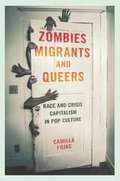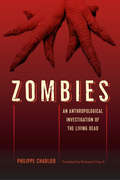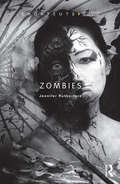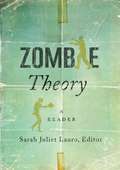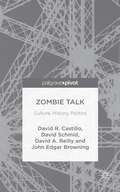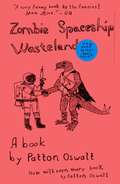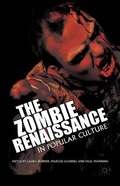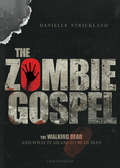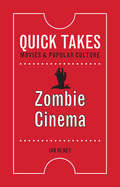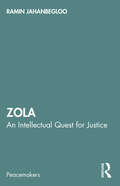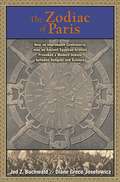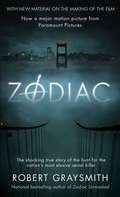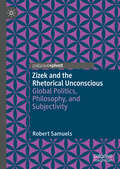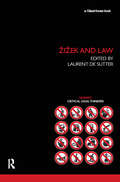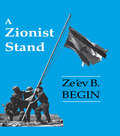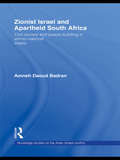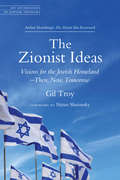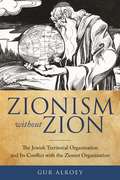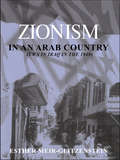- Table View
- List View
Zombies, Migrants, and Queers: Race and Crisis Capitalism in Pop Culture
by Camilla FojasThe alarm and anxiety unleashed by the Great Recession found fascinating expression across popular culture. Harried survivors negotiated societal collapse in The Walking Dead. Middle-class whites crossed the literal and metaphorical Mexican border on Breaking Bad or coped with a lack of freedom among the marginalized on Orange Is the New Black. Camilla Fojas uses representations of people of color, the incarcerated, and trans/queers--vulnerable populations all--to work through the contradictions created by the economic crisis and its freefalling aftermath. Television, film, advertising, and media coverage of the crisis created a distinct kind of story about capitalism and the violence that supports it. Fojas shows how these pop culture moments reshaped social dynamics and people's economic sensibilities and connects the ways pop culture reflected economic devastation. She also examines how these artifacts illuminated parts of society usually kept off-screen or on the margins even as they defaulted to stories of white protagonists.
The Zombies Are Coming!: The Realities of the Zombie Apocalypse in American Culture
by Kelly J. BakerZombie Runs. Zombie Guns. Zombie Preparation Classes. Look anywhere in America these days, and you're sure to find the living dead. We have TV shows, comics, novels, and films all enthralled to the vision of a world post-zombie apocalypse. But what's the line between fantasy and real life? Horror fiction and real danger? In today's zombie culture, that line is blurrier than ever. In this engaging, head-spinning ebook, zombie expert Kelly J. Baker shows us how our fascination with zombies has bled into far-reaching corners of American culture, including apocalypse preppers, gun shows, and even the federal government. How do we know the zombies are coming? Because they're already here.
Zombies: An Anthropological Investigation of the Living Dead
by Philippe Charlier“A compelling account of the zombi as an anthropological reality and evocative symbol of a state of dispossession, desperation, and death.”—Roger Luckhurst, author of Zombies: A Cultural History “An adventurer’s anthropological quest offering a novel description of the contemporary zombie.”—Sarah J. Lauro, author of The Transatlantic Zombie: Slavery, Rebellion, and Living Death “Displays an empathy for the cultural reality of the zombie in Haiti that delivers important insight on the island nation’s people and their lived realities.”—Christopher M. Moreman, coeditor of Race, Oppression and the Zombie: Essays on Cross-Cultural Appropriations of the Caribbean Tradition Forensic pathologist Philippe Charlier—dubbed the “Indiana Jones of the graveyards”—travels to Haiti where rumors claim that some who die may return to life as zombies. Charlier investigates these far-fetched stories and finds that, in Haiti, the dead are a part of daily life. Families, fearing that loved ones may return from the grave, urge pallbearers to take rambling routes to prevent the recently departed from finding their way home from cemeteries. Corpses are sometimes killed a second time…just to be safe. And a person might spend their life preparing their funeral and grave to ensure they will not become a wandering soul after death. But are the stories true? Charlier’s investigations lead him to Vodou leader Max Beauvoir and other priests, who reveal how bodies can be reanimated. In some cases, sorcerers lure the dead from their graves and give them a potion concocted from Devil’s Snare, a plant more commonly known as Jimsonweed. Sometimes secret societies use poudre zombi—“zombie powder”—spiked with the tetrodotoxin found in blowfish. Charlier eagerly collects evidence, examining Vodou dolls by X-ray, making sacrifices at rituals, and visiting cemeteries under the cloak of night. Zombies follows Charlier’s journey to understand the fascinating and frightening world of Haiti’s living dead, inviting readers to believe the unbelievable.
Zombies (Shortcuts)
by Jennifer RutherfordNot so long ago zombies rarely shuffled out of B-grade horror movies and cult comic books, but today they are everywhere. Zombies are proliferating, demonstrating an extraordinary capacity to transport fluidly from genre to genre, from the apocalyptic future to the already survived past, and in and out of fictional form. Today they can be found in just about any genre or discourse and as they move sinuously across the cultural landscape they keep morphing; taking on ever new and ever more bizarre associations. Zombies would appear to be unthinkable, the ultimate nightmare of a world devoured by the dead, and yet more and more often this horror-scape provides a form of figurative capture for the way things are. This book explores why. Zombies explores the recent transformation of zombie from cult genre to a figure that pervades western culture. Rutherford examines the zombie as a powerful metaphor for a constellation of social forces that define contemporary reality. This is an ideal introduction to all that is social about zombies, for students and general readers alike.Extracts from Zombies, were recently published in Australian newspapers, The Age, The Canberra Times and the Sydney Morning Herald. Available now to read online: www.theage.com.au/entertainment/books/dead-right-20130620-2olqr.html
Zombie Theory: A Reader
by Sarah Juliet LauroZombies first shuffled across movie screens in 1932 in the low-budget Hollywood film White Zombie and were reimagined as undead flesh-eaters in George A. Romero’s The Night of the Living Dead almost four decades later. Today, zombies are omnipresent in global popular culture, from video games and top-rated cable shows in the United States to comic books and other visual art forms to low-budget films from Cuba and the Philippines. The zombie’s ability to embody a variety of cultural anxieties—ecological disaster, social and economic collapse, political extremism—has ensured its continued relevance and legibility, and has precipitated an unprecedented deluge of international scholarship. Zombie studies manifested across academic disciplines in the humanities but also beyond, spreading into sociology, economics, computer science, mathematics, and even epidemiology. Zombie Theory collects the best interdisciplinary zombie scholarship from around the world. Essays portray the zombie not as a singular cultural figure or myth but show how the undead represent larger issues: the belief in an afterlife, fears of contagion and technology, the effect of capitalism and commodification, racial exclusion and oppression, dehumanization. As presented here, zombies are not simple metaphors; rather, they emerge as a critical mode for theoretical work. With its diverse disciplinary and methodological approaches, Zombie Theory thinks through what the walking undead reveal about our relationships to the world and to each other.Contributors: Fred Botting, Kingston U; Samuel Byrnand, U of Canberra; Gerry Canavan, Marquette U; Jeffrey Jerome Cohen, George Washington U; Jean Comaroff, Harvard U; John Comaroff, Harvard U; Edward P. Comentale, Indiana U; Anna Mae Duane, U of Connecticut; Karen Embry, Portland Community College; Barry Keith Grant, Brock U; Edward Green, Roosevelt U; Lars Bang Larsen; Travis Linnemann, Eastern Kentucky U; Elizabeth McAlister, Wesleyan U; Shaka McGlotten, Purchase College-SUNY; David McNally, York U; Tayla Nyong’o, Yale U; Simon Orpana, U of Alberta; Steven Shaviro, Wayne State U; Ola Sigurdson, U of Gothenburg; Jon Stratton, U of South Australia; Eugene Thacker, The New School; Sherryl Vint, U of California Riverside; Priscilla Wald, Duke U; Tyler Wall, Eastern Kentucky U; Jen Webb, U of Canberra; Jeffrey Andrew Weinstock, Central Michigan U.
Zombie Talk: Culture, History, Politics
by John Browning David Schmid David Castillo David ReillyZombie Talk offers a concise, interdisciplinary introduction and deep analytical set of theoretical approaches to help readers understand the phenomenon of zombies in contemporary and modern culture. With essays that combine Humanities and Social Science methodologies, the authors examine the zombie through an array of cultural products from different periods and geographical locations: films ranging from White Zombie (1932) to the pioneering films of George Romero, television shows like AMC's The Walking Dead, to literary offerings such as Richard Matheson's I am Legend (1954) and Seth Grahame-Smith's Pride, Prejudice and Zombies (2009), among others.
Zombie Spaceship Wasteland: A Book by Patton Oswalt
by Patton OswaltPrepare yourself for a journey through the world of Patton Oswalt, one of the most creative, insightful, and hysterical voices on the entertainment scene today. Widely known for his roles in the films Big Fan and Ratatouille, as well as the television hit The King of Queens, Patton Oswalt--a staple of Comedy Central--has been amusing audiences for decades. Now, with Zombie Spaceship Wasteland, he offers a fascinating look into his most unusual, and lovable, mindscape. Oswalt combines memoir with uproarious humor, from snow forts to Dungeons & Dragons to gifts from Grandma that had to be explained. He remembers his teen summers spent working in a movie Cineplex and his early years doing stand-up. Readers are also treated to several graphic elements, including a vampire tale for the rest of us and some greeting cards with a special touch. Then there's the book's centerpiece, which posits that before all young creative minds have anything to write about, they will home in on one of three story lines: zombies, spaceships, or wastelands. Oswalt chose wastelands, and ever since he has been mining our society's wasteland for perversion and excess, pop culture and fatty foods, indie rock and single-malt scotch. Zombie Spaceship Wasteland is an inventive account of the evolution of Patton Oswalt's wildly insightful worldview, sure to indulge his legion of fans and lure many new admirers to his very entertaining "wasteland."
Zombie Spaceship Wasteland: A Book by Patton Oswalt
by Patton OswaltPrepare yourself for a journey through the world of Patton Oswalt, one of the most creative, insightful, and hysterical voices on the entertainment scene today. Widely known for his roles in the films Big Fan and Ratatouille, as well as the television hit The King of Queens, Patton Oswalt--a staple of Comedy Central--has been amusing audiences for decades. Now, with Zombie Spaceship Wasteland, he offers a fascinating look into his most unusual, and lovable, mindscape. Oswalt combines memoir with uproarious humor, from snow forts to Dungeons & Dragons to gifts from Grandma that had to be explained. He remembers his teen summers spent working in a movie Cineplex and his early years doing stand-up. Readers are also treated to several graphic elements, including a vampire tale for the rest of us and some greeting cards with a special touch. Then there's the book's centerpiece, which posits that before all young creative minds have anything to write about, they will home in on one of three story lines: zombies, spaceships, or wastelands. Oswalt chose wastelands, and ever since he has been mining our society's wasteland for perversion and excess, pop culture and fatty foods, indie rock and single-malt scotch. Zombie Spaceship Wasteland is an inventive account of the evolution of Patton Oswalt's wildly insightful worldview, sure to indulge his legion of fans and lure many new admirers to his very entertaining "wasteland."
Zombie Spaceship Wasteland
by Patton OswaltPrepare yourself for a journey through the world of Patton Oswalt, one of the most creative, insightful, and hysterical voices on the entertainment scene today. Widely known for his roles in the films Big Fan and Ratatouille, as well as the television hit The King of Queens, Patton Oswalt--a staple of Comedy Central--has been amusing audiences for decades. Now, with Zombie Spaceship Wasteland, he offers a fascinating look into his most unusual, and lovable, mindscape. Oswalt combines memoir with uproarious humor, from snow forts to Dungeons & Dragons to gifts from Grandma that had to be explained. He remembers his teen summers spent working in a movie Cineplex and his early years doing stand-up. Readers are also treated to several graphic elements, including a vampire tale for the rest of us and some greeting cards with a special touch. Then there's the book's centerpiece, which posits that before all young creative minds have anything to write about, they will home in on one of three story lines: zombies, spaceships, or wastelands. Oswalt chose wastelands, and ever since he has been mining our society's wasteland for perversion and excess, pop culture and fatty foods, indie rock and single-malt scotch. Zombie Spaceship Wasteland is an inventive account of the evolution of Patton Oswalt's wildly insightful worldview, sure to indulge his legion of fans and lure many new admirers to his very entertaining "wasteland."
The Zombie Renaissance in Popular Culture
by Laura Hubner Marcus Leaning Paul ManningThis collection addresses the significant cultural phenomenon of the 'zombie renaissance' - the growing importance of zombie texts and zombie cultural practices in popular culture. The chapters examine zombie culture across a range of media and practices including films games, music, social media, literature and fandom.
The Zombie Gospel: The Walking Dead and What It Means to Be Human
by Danielle StricklandThe Walking DeadThe Zombie GospelThe Walking DeadThe Walking Dead
Zombie Cinema
by Ian OlneyIt’s official: the zombie apocalypse is here. The living dead have been lurking in popular culture since the 1930s, but they have never been as ubiquitous or as widely-embraced as they are today.Zombie Cinema is a lively and accessible introduction to this massively popular genre. Presenting a historical overview of zombie appearances in cinema and on television, Ian Olney also considers why, more than any other horror movie monster, zombies have captured the imagination of twenty-first-century audiences. Surveying the landmarks of zombie film and TV, from White Zombie to The Walking Dead, the book also offers unique insight into why zombies have gone global, spreading well beyond the borders of American and European cinema to turn up in films from countries as far-flung as Cuba, India, Japan, New Zealand, and Nigeria. Both fun and thought-provoking, Zombie Cinema will give readers a new perspective on our ravenous hunger for the living dead.
Zola: An Intellectual Quest for Justice (Peacemakers)
by Ramin JahanbeglooThis book examines the figure of the public intellectual through the work of Émile Zola in the Dreyfus affair. It analyzes Zola’s famous letter “J’Accuse” supporting Alfred Dreyfus and its philosophical and political consequences for the intellectual world, including Indian public intellectuals. The volume is an examination of the critical role that can be played by public intellectuals today by referring to the “J’Accuse” model and a homage to the ideal of living decently and truthfully through the exercise of critical reason and moral excellence. Accessible and comprehensive, the book will be essential reading for students of philosophy and critical reasoning. It will be of interest to general readers as well.
The Zodiac of Paris: How an Improbable Controversy over an Ancient Egyptian Artifact Provoked a Modern Debate between Religion and Science
by Jed Z. Buchwald Diane Greco JosefowiczThe clash of faith and science in Napoleonic FranceThe Dendera zodiac—an ancient bas-relief temple ceiling adorned with mysterious symbols of the stars and planets—was first discovered by the French during Napoleon's campaign in Egypt, and quickly provoked a controversy between scientists and theologians. Brought to Paris in 1821 and ultimately installed in the Louvre, where it can still be seen today, the zodiac appeared to depict the nighttime sky from a time predating the Biblical creation, and therefore cast doubt on religious truth. The Zodiac of Paris tells the story of this incredible archeological find and its unlikely role in the fierce disputes over science and faith in Napoleonic and Restoration France.The book unfolds against the turbulence of the French Revolution, Napoleon's breathtaking rise and fall, and the restoration of the Bourbons to the throne. Drawing on newspapers, journals, diaries, pamphlets, and other documentary evidence, Jed Buchwald and Diane Greco Josefowicz show how scientists and intellectuals seized upon the zodiac to discredit Christianity, and how this drew furious responses from conservatives and sparked debates about the merits of scientific calculation as a source of knowledge about the past. The ideological battles would rage until the thoroughly antireligious Jean-François Champollion unlocked the secrets of Egyptian hieroglyphs—and of the zodiac itself. Champollion would prove the religious reactionaries right, but for all the wrong reasons.The Zodiac of Paris brings Napoleonic and Restoration France vividly to life, revealing the lengths to which scientists, intellectuals, theologians, and conservatives went to use the ancient past for modern purposes.
Zodiac
by Robert GraysmithThe shocking true story of the hunt for the nation's most elusive serial killer, a sexual sadist who took pleasure in torture and murder and taunting the police
Zizek and the Rhetorical Unconscious: Global Politics, Philosophy, and Subjectivity
by Robert SamuelsThis book builds on a critique of Slavoj Zizek’s work to outline a new theory of psychoanalytic rhetoric. It turns to Zizek because not only is he one of the most popular intellectuals in the world, but, this book argues, his discourse is shaped by a set of unconscious rhetorical processes that also determine much of contemporary politics, culture, and subjectivity. Just as Aristotle argued that the three main forms of persuasion are logos (reason), pathos (emotion), and ethos (authority), Samuels describes each one of these aspects of communication as related to a fundamental psychoanalytic concept. He also turns to Aristotle’s work on theater to introduce a fourth form of rhetoric, catharsis, which is the purging of feelings of fear and pity. Adding a strong voice to current psychoanalytic debate, this book will be of value to all scholars and students interested in both the history and modern developments of psychoanalytic theory.
Zizek and Law (Nomikoi: Critical Legal Thinkers)
by Laurent De SutterThe very first book dedicated to Slavoj Zizek’s theoretical treatment of law, this book gathers widely recognized Zizek scholars as well as legal theorists to offer a sustained analysis of the place of law in Zizek’s work. Whether it is with reference to symbolic law, psychoanalytical law, religious law, positive law, human rights, to Lacan’s, Hegel’s, or Kant’s philosophies of law, or even to Jewish or Buddhist law, Zizek returns again and again to law. And what his work offers, this volume demonstrates, is a radically new approach to law, and a rethinking of its role within the framework of radical politics. With the help of Zizek himself – who here, and for the first time, directly engages with the topic of law – this collection provides an authoritative account of ‘Zizek and law’. It will be invaluable resource for researchers and students in the fields of law, legal theory, legal philosophy, political theory, psychoanalysis, theology, and cultural studies.
Zivilgesellschaftliche Performanz von religiösen und säkularen Migrantenselbstorganisationen: Eine Studie in Nordrhein-Westfalen
by Anna Wiebke KlieDas vorliegende Open-Access-Buch trägt in theoretischer und empirischer Hinsicht zu einem besseren Verständnis der Eigenschaften und zivilgesellschaftlichen Verortung von religiösen und säkularen Migrantenselbstorganisationen (MSO) bei. MSO werden unter migrations-, religions- sowie organisationssoziologischen Blickwinkeln betrachtet, in politische Felder und Diskurse eingeordnet und die jeweiligen Positionen mit den Ergebnissen einer (nicht-repräsentativen) Befragung von MSO in neun Großstädten Nordrhein-Westfalens ins Verhältnis gesetzt. Bei der Erhebung wurden organisationsspezifische Merkmale, Ressourcenausstattungen und zivilgesellschaftliche Eigenschaften in den Blick genommen, die wiederum Aktivitäten, Ziele, Selbstverständnisse, das Kooperationsspektrum sowie die Umweltbeziehungen der MSO umfassen. Insgesamt unterstreichen die Ergebnisse für die beiden unterschiedenen Organisationstypen viele Gemeinsamkeiten, zugleich aber auch spezifische Binnen- und Außenverhältnisse. Eine Reduzierung ausschließlich auf religiöse oder säkulare Merkmale wird ihrer Charakterisierung also nicht gerecht – vielmehr ist von einer Vermischung von Handlungslogiken auszugehen.
Zivilgesellschaft und Stadtöffentlichkeit: Eine akteurszentrierte Analyse der kommunikativen Figuration der Stadt
by Katharina Heitmann-WernerStadtöffentlichkeiten sind bunt, vielfältig und heterogen. Besonders deutlich wird dies bei der Analyse der beteiligten Akteure. Denn während klassische Öffentlichkeitsakteure, wie etwa lokale Medien bereits vielfach wissenschaftlich erforscht worden sind, nimmt dieses Buch eine Akteursgruppe unter die Lupe, die bisher aus kommunikations- und medienwissenschaftlicher Perspektive wenige Beachtung erfahren hat. Zivilgesellschaftliche Kollektive wie Sportvereine, soziale Bewegungen oder Kunst- und Kultureinrichtungen prägen mit ihren vielfältigen Angeboten und Aktionen das Stadtbild. Gleichzeitig prägen sie auch die städtische Öffentlichkeit, indem sie sich aktiv an ihrer Konstitution beteiligen. Die Autorin identifiziert sieben unterschiedliche Typen zivilgesellschaftlicher Kollektive, die jeweils ganz eigene Medienpraktiken und -ensembles zur öffentlichen Kommunikation einsetzen. Sie verfolgen dabei sehr unterschiedliche Ziele innerhalb der Stadtöffentlichkeit und agieren innerhalbjeweils sehr verschiedener Netzwerke. Das Buch stellt die äußerst relevante Rolle dieser Akteure bei der Öffentlichkeitskonstitution heraus und zeigt, dass es gewinnbringend ist, Akteure von Stadtöffentlichkeiten nicht isoliert zu erforschen, sondern innerhalb ihrer Beziehungsgefüge zu anderen Akteuren der Stadtöffentlichkeit.
Zivil - Gesellschaft - Staat
by Thomas Bibisidis Jaana Eichhorn Ansgar Klein Christa Perabo Susanne RindtDer Band thematisiert die Bedeutung der Freiwilligendienste hinsichtlich ihrer Potenziale und Wirkungen für die Zivilgesellschaft, ihre Handlungsfelder und Rahmenbedingungen und nimmt die beteiligten Akteure in den Blick. Dabei geht es um Entwicklungslinien, Profildiskussionen und aktuelle Debatten, u. a. zu Fragen der Qualitätssicherung, zum Bildungsbegriff, der politischen Indienstnahme von Freiwilligendiensten, zur Arbeitsmarktneutralität und zum Trägerprinzip als konstitutivem Merkmal der Freiwilligendienste.
A Zionist Stand
by Ze'ev B. BeginA member of the Knesset, Dr Begin here reflects upon the mainstream political thought of the Likud Party which came to power in 1977. This book analyzes the basic factors relevant to the Israeli position in the Middle East, providing a different outlook on the complexities of the region.
Zionist Israel and Apartheid South Africa: Civil society and peace building in ethnic-national states (Routledge Studies on the Arab-Israeli Conflict)
by Amneh BadranThis book is a comparison of two ethnic-national "apartheid" states – South Africa and Israel – which have been in conflict, and how internal dissent has developed. In particular it examines the evolution of effective white protest in South Africa and explores the reasons why comparably powerful movements have not emerged in Israel. The book reveals patterns of behaviour shared by groups in both cases. It argues that although the role played by protest groups in peace-building may be limited, a tipping point, or ‘magic point’, can become as significant as other major factors. It highlights the role played by intermediate variables that affect the pathways of protest groups: such as changes in the international system; the visions and strategies of resistance movements and their degree of success; the economic relationship between the dominant and dominated side; and the legitimacy of the ideology in power (apartheid or Zionism). Although the politics and roles of protest groups in both cases share some similarities, differences remain. Whilst white protest groups moved towards an inclusive peace agenda that adopts the ANC vision of a united non-racial democratic South Africa, the Jewish Israeli protest groups are still, by majority, entrenched in their support for an exclusive Jewish state. And as such, they support separation between the two peoples and a limited division of mandatory Palestine / ‘Eretz Israel’. This timely book sheds light on a controversial and explosive political issue: Israel being compared to apartheid South Africa.
The Zionist Ideas: Visions for the Jewish Homeland—Then, Now, Tomorrow (JPS Anthologies of Jewish Thought)
by Gil Troy Natan SharanskyThe most comprehensive Zionist collection ever published, The Zionist Ideas: Visions for the Jewish Homeland—Then, Now, Tomorrow sheds light on the surprisingly diverse and shared visions for realizing Israel as a democratic Jewish state. Building on Arthur Hertzberg’s classic, The Zionist Idea, Gil Troy explores the backstories, dreams, and legacies of more than 170 passionate Jewish visionaries—quadruple Hertzberg’s original number and now including women, mizrachim, and others—from the 1800s to today. Troy divides the thinkers into six Zionist schools of thought—Political, Revisionist, Labor, Religious, Cultural, and Diaspora Zionism—and reveals the breadth of the debate and surprising syntheses. He also presents the visionaries within three major stages of Zionist development, demonstrating the length and evolution of the conversation. Part 1 (pre-1948) introduces the pioneers who founded the Jewish state, such as Herzl, Gordon, Jabotinsky, Kook, Ha’am, and Szold. Part 2 (1948 to 2000) features builders who actualized and modernized the Zionist blueprints, such as Ben-Gurion, Berlin, Meir, Begin, Soloveitchik, Uris, and Kaplan. Part 3 showcases today’s torchbearers, including Barak, Grossman, Shaked, Lau, Yehoshua, and Sacks. This mosaic of voices will engage equally diverse readers in reinvigorating the Zionist conversation—weighing and developing the moral, social, and political character of the Jewish state of today and tomorrow.
Zionism without Zion: The Jewish Territorial Organization and Its Conflict with the Zionist Organization
by Gur AlroeyWhile the ideologies of Territorialism and Zionism originated at the same time, the Territorialists foresaw a dire fate for Eastern European Jews, arguing that they could not wait for the Zionist Organization to establish a Jewish state in Palestine. This pessimistic worldview led Territorialists to favor a solution for the Jewish state "here and now"--and not only in the Land of Israel. In Zionism without Zion: The Jewish Territorial Organization and Its Conflict with the Zionist Organization, author Gur Alroey examines this group's unique perspective, its struggle with the Zionist movement, its Zionist rivals' response, and its diplomatic efforts to obtain a territory for the Jewish people in the first decades of the twentieth century. Alroey begins by examining the British government's Uganda Plan and the ensuing crisis it caused in the Zionist movement and Jewish society. He details the founding of the Jewish Territorial Organization (ITO) in 1903 and explains the varied reactions that the Territorialist ideology received from Zionists and settlers in Palestine. Alroey also details the diplomatic efforts of Territorialists during their desperate search for a suitable territory, which ultimately never bore fruit. Finally, he attempts to understand the reasons for the ITO's dissolution after the Balfour Declaration, explores the revival of Territorialism with the New Territorialists in the 1930s and 1940s, and describes the similarities and differences between the movement then and its earlier version. Zionism without Zion sheds new light on the solutions Territorialism proposed to alleviate the hardship of Eastern European Jews at the start of the twentieth century and offers fresh insights into the challenges faced by Zionism in the same era. The thorough discussion of this under-studied ideology will be of considerable interested to scholars of Eastern European history, Jewish history, and Israel studies.
Zionism in an Arab Country: Jews in Iraq in the 1940s
by Esther Meir-GlitzensteinZionism in an Arab Country explores the relations between the Zionist establishment in Israel, and the Jewish community in Iraq. This relationship is centred on two organizations: a Zionist movement and a defense organization. By reviewing the activity of these organizations, Esther Meir-Glitzstein examines the decade preceding mass immigration, and reveals the political, societal, economic and cultural developments that shaped the history of Iraqi Jewry in this crucial period.Beyond the main focus on the sphere of Zionist activity, Meir-Glitzstein also uncovers the basic problems that shaped both the development of Iraqi Jewry in the 1940s and the policy of the Zionist establishment - trapped between Arab nationalism and Jewish nationalism. Finally, she elucidates the reasons and circumstances that led to the mass immigration of Jews from Iraq to the state of Israel.
